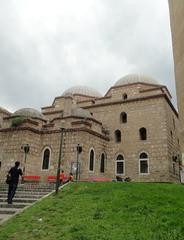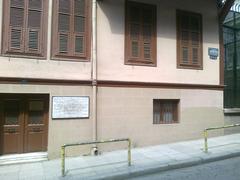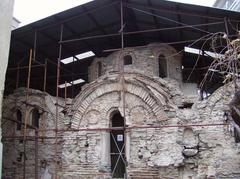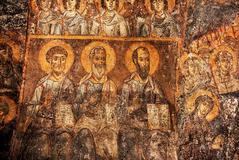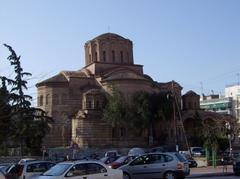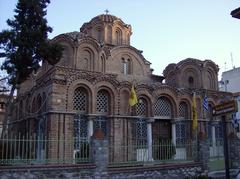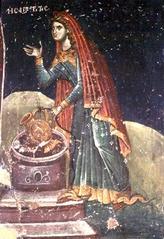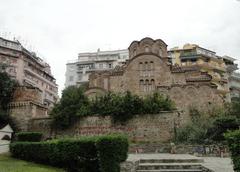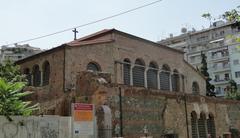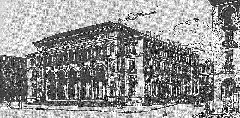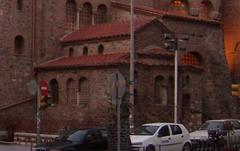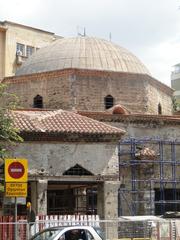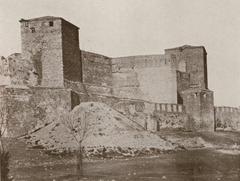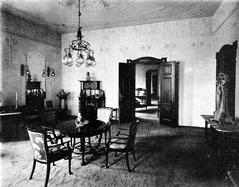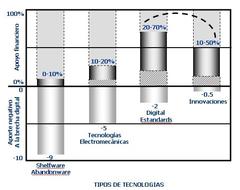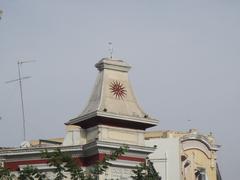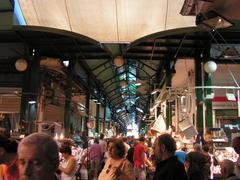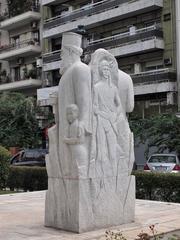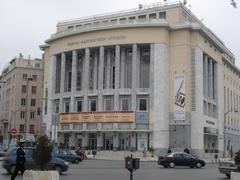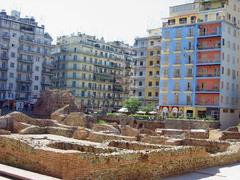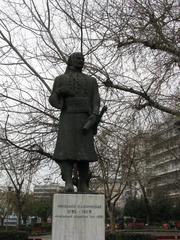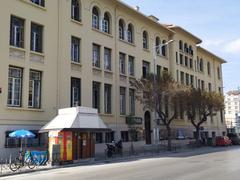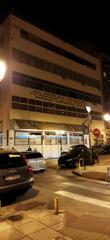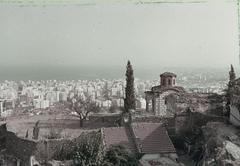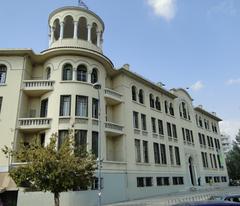Orphanage Allatini Visiting Hours, Tickets, and Historical Guide – Thessaloniki
Date: 04/07/2025
Introduction
Situated in the vibrant city of Thessaloniki, Greece, the Orphanage Allatini stands as a testament to the city’s rich multicultural heritage, architectural innovation, and the philanthropic spirit of the influential Allatini family. Established in the late 19th to early 20th century by the Jewish-Italian Allatini family, the orphanage reflects both the architectural eclecticism and the resilience of Thessaloniki’s once-thriving Jewish community (SpringerLink; ScienceDirect). Today, the site is recognized for its historical, cultural, and architectural significance, serving as a symbol of Thessaloniki’s layered past.
This guide provides detailed information on the orphanage’s history, visiting hours, ticketing, accessibility, guided tours, and nearby attractions, ensuring visitors an informed and meaningful experience. Whether your interest is architectural heritage, Jewish history, or philanthropy, the Orphanage Allatini offers a window into the story of Thessaloniki.
Table of Contents
- The Allatini Family: Origins and Influence
- The Orphanage Allatini: Architecture and Social Purpose
- Jewish Heritage and Community Significance
- Visiting Information: Hours, Tickets, and Access
- Nearby Attractions and Travel Tips
- Preservation Challenges and Current Status
- Frequently Asked Questions (FAQ)
- Plan Your Visit and Resources
The Allatini Family: Origins and Influence
The Allatini family, of Sephardic Jewish origin, became one of Thessaloniki’s most prominent families by the 19th century. Their ascent paralleled the city’s growth as a commercial and cultural hub during the Ottoman era, especially following the arrival of Jewish refugees expelled from Spain in 1492 (SpringerLink). Moïse Allatini (1809–1882) catalyzed the family’s influence by founding the Fratelli Allatini company and establishing technologically advanced flour mills, which became landmarks of industrial progress (OfflinePost). The family diversified into banking, real estate, and philanthropic initiatives, leaving a substantial mark on the city’s economic and social landscape.
Their architectural patronage is evident in the construction of grand villas, such as Villa Allatini, designed by Italian architect Vitaliano Poselli in 1898 (Thessaloniki Tourism), and other notable mansions that collectively define Thessaloniki’s eclectic urban fabric (Greece Is).
The Orphanage Allatini: Architecture and Social Purpose
Architectural Style and Features
The Orphanage Allatini, constructed in the late 19th or early 20th century, exemplifies Thessaloniki’s eclectic architectural movement. Its design fuses neoclassical, Renaissance, Baroque, and Ottoman influences (ScienceDirect), evident in its façade composition, ornamentation, and structural innovations such as the use of reinforced concrete for expansive interiors. Typical features include symmetrical arrangements, ornate stucco work, wrought iron balconies, and a mix of Western and local motifs.
Social Mission
Built during a period of rapid urbanization, the orphanage was more than a shelter—it was a center for education, care, and cultural continuity for vulnerable children. Its layout prioritized dormitories, classrooms, dining halls, and recreational areas, reflecting a progressive philanthropic vision. The institution became a nurturing environment that embodied the Allatini family’s commitment to social welfare and the Jewish community’s tradition of mutual aid (Greece-Is).
Jewish Heritage and Community Significance
Thessaloniki’s Jewish community, often called the “Mother of Israel,” developed a unique identity after the arrival of Sephardic Jews in 1492. By the 1930s, Jews formed nearly half of the city’s population (Athens Insider). The Allatini Orphanage, funded by the family and other benefactors, stood as a beacon of hope, especially during times of crisis, such as the influx of refugees and the aftermath of the city’s devastating fires.
During the Holocaust, the Jewish community was decimated, with most deported to Nazi concentration camps. The orphanage, like many communal institutions, was deeply affected. Today, it serves as a silent witness to both the achievements and tragedies of Thessaloniki’s Jews (JGuide Europe; Athens Insider).
Visiting Information: Hours, Tickets, and Access
Location
- Address: 198 Vassilissis Olgas Street (Exoches District) and 3 Paraskevopoulou Street (junction with Spartis Street), Thessaloniki 546 41, Greece (Travel the Greek Way)
- Access: Easy to reach by public bus (lines 2, 10, and 12), taxi, or on foot from the city center.
Visiting Hours and Ticketing
- Exterior Viewing: The exterior of the Orphanage Allatini can be viewed at any time.
- Interior Access: The building is not regularly open to the public due to preservation concerns. Occasionally, special events or guided tours allow limited interior access (Visit Central Macedonia).
- Tickets: No tickets are required for exterior viewing. Guided tours or special events may have a fee (typically €5–€10).
Accessibility
- The surrounding area is accessible by foot and public transport.
- The building itself is not wheelchair accessible; interior visits require special arrangements and are not recommended for those with mobility challenges.
- Visitors are encouraged to approach the site respectfully, as it remains a place of historical memory.
Guided Tours
- Jewish heritage tours offered by local operators and the Jewish Community of Thessaloniki often include the orphanage as part of a broader itinerary (Greek Transfer Services).
- Tours provide in-depth historical context and personal stories.
Nearby Attractions and Travel Tips
Combine your visit with other sites of historical and cultural interest:
- Villa Allatini: A stunning example of eclectic architecture.
- Jewish Museum of Thessaloniki: Exhibits on Thessaloniki’s Jewish community (JGuide Europe).
- Yeni Mosque: A reflection of the city’s multicultural past.
- Thessaloniki Waterfront: For a relaxing stroll along the sea.
- Historic Exoches District: Known for its elegant mansions and cosmopolitan ambiance.
Tips:
- Spring and autumn offer the best weather for exploring.
- Check for Holocaust Remembrance Day (January 27) or other commemorative events.
- Respect photography restrictions, especially during private or memorial events.
Preservation Challenges and Current Status
Structural and Administrative Issues
- The Orphanage Allatini faces structural deterioration due to neglect and age (Travel the Greek Way).
- Restoration is hampered by limited funding and complex administrative procedures (Visit Central Macedonia).
- Urban development pressures compete with heritage preservation.
Community Engagement
- Ongoing efforts by local organizations seek to raise awareness, promote adaptive reuse, and maintain the site’s relevance in Thessaloniki’s cultural landscape.
Frequently Asked Questions (FAQ)
Q: What are the Orphanage Allatini’s visiting hours?
A: The exterior can be visited any time. No regular interior visiting hours are available.
Q: Is there an entrance fee?
A: No fee for exterior viewing; guided tours or special events may have a charge.
Q: Are guided tours available?
A: Yes, particularly on Jewish heritage tours. Contact local tourism offices or the Jewish Community of Thessaloniki.
Q: Is the building accessible for people with disabilities?
A: The surrounding area is accessible, but the building is not due to its condition.
Q: Can I take photos?
A: Personal photography of the exterior is allowed; interior photography may be restricted.
Plan Your Visit and Resources
- Jewish Museum of Thessaloniki: Official website | Tel: +30 231 025 0406
- Visit Central Macedonia: Official tourism site
- Guided Tours: Bookable via local operators or the Greek Transfer Services
- Stay Updated: Follow local heritage organizations for announcements on special events or restoration projects.
For a richer experience, explore virtual tours and photo galleries on the Visit Central Macedonia site.
Travel tip: Download the Audiala app for guided tours, up-to-date information, and exclusive content about Thessaloniki’s historical sites (Audiala).
Summary and Visitor Tips
The Orphanage Allatini is a powerful symbol of Thessaloniki’s multicultural and philanthropic legacy. Its distinctive architecture and poignant history offer a unique lens into the city’s cosmopolitan identity and Jewish heritage (ScienceDirect; Visit Central Macedonia). While interior access is limited, visitors can engage deeply with the site’s exterior and surrounding district, participate in guided tours, and contribute to ongoing preservation efforts.
Plan your visit, respect the site’s significance, and immerse yourself in one of Thessaloniki’s most important historical narratives.
References and Further Reading
- SpringerLink
- ScienceDirect
- Greece-Is
- Visit Central Macedonia
- Thessaloniki Tourism
- Greek Transfer Services
- Athens Insider
- Greek Reporter
- JGuide Europe
- Travel the Greek Way
